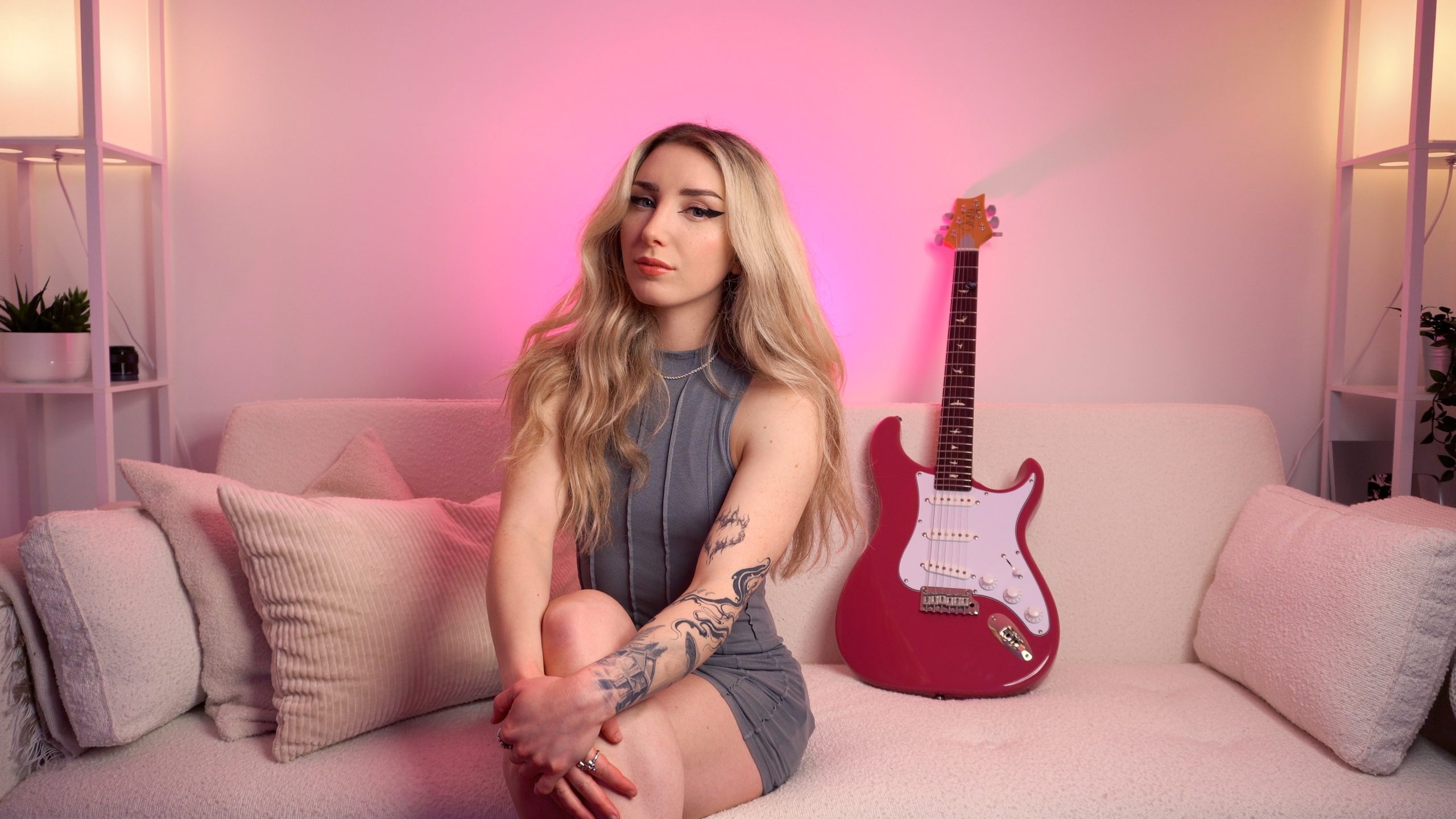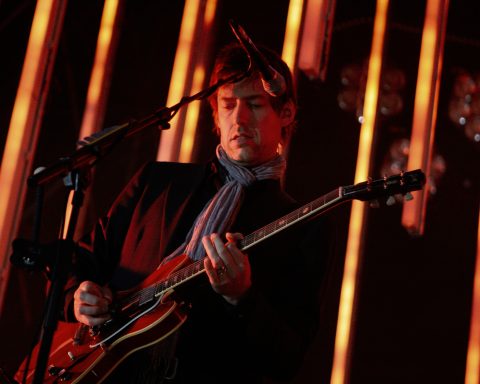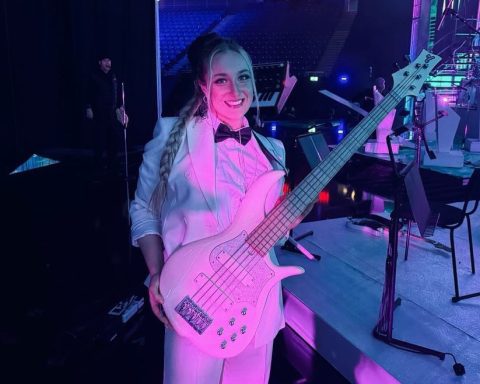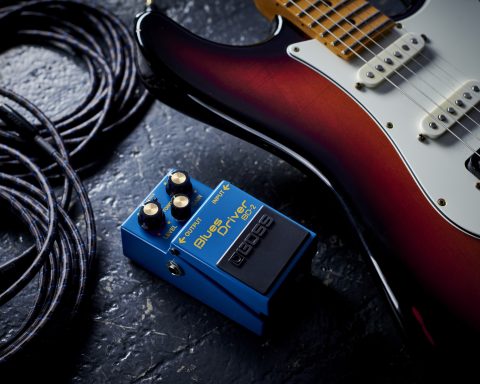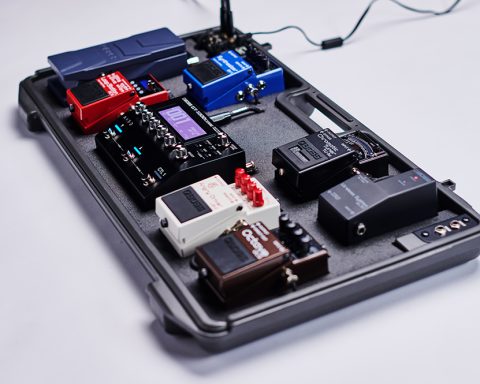With over two million social media followers and viral videos aplenty, Sophie Burrell is a Gen Z guitar phenom. When lockdown hit, the digital native naturally turned to YouTube, Instagram, Facebook, and TikTok to connect with the guitar world. Having achieved global success as a content creator, Burrell is focusing on good, old-fashioned live performance. The internet star’s hard-rocking three-piece, Bxrrell, will be hitting the road for the first time this spring. Fronted by Burrell on guitar and vocals, the group is slated to drop its debut album later in the year. We caught up with the shred virtuoso before her forthcoming tour to talk about the power of songwriting and how she’s “working towards stamping out separation, misogyny, and sexism.”
Player, Writer, Influencer
You’re known as a YouTuber and social media influencer, though your band, Bxrrell, will drop its debut album later this year. How would you describe yourself?
First and foremost, I’m a guitarist and songwriter. I’m also a content creator. When I was a kid, I never envisioned becoming a content creator. I never imagined myself doing this—especially when it comes to the influencer side of things where I’m actually talking. I always thought I was gonna do the music and not say a word. So, it’s really interesting it’s evolved into that.
How and when did you become so popular online?
I was in a band, but then the pandemic hit. I leaned into the online stuff because I was like, “What the hell else am I going to do?” The plan was to grow my socials, so that I had people to play to when I was finally in another band. Pre-pandemic, my Instagram was sitting around 100,000 followers. Post-pandemic, it had more than tripled.
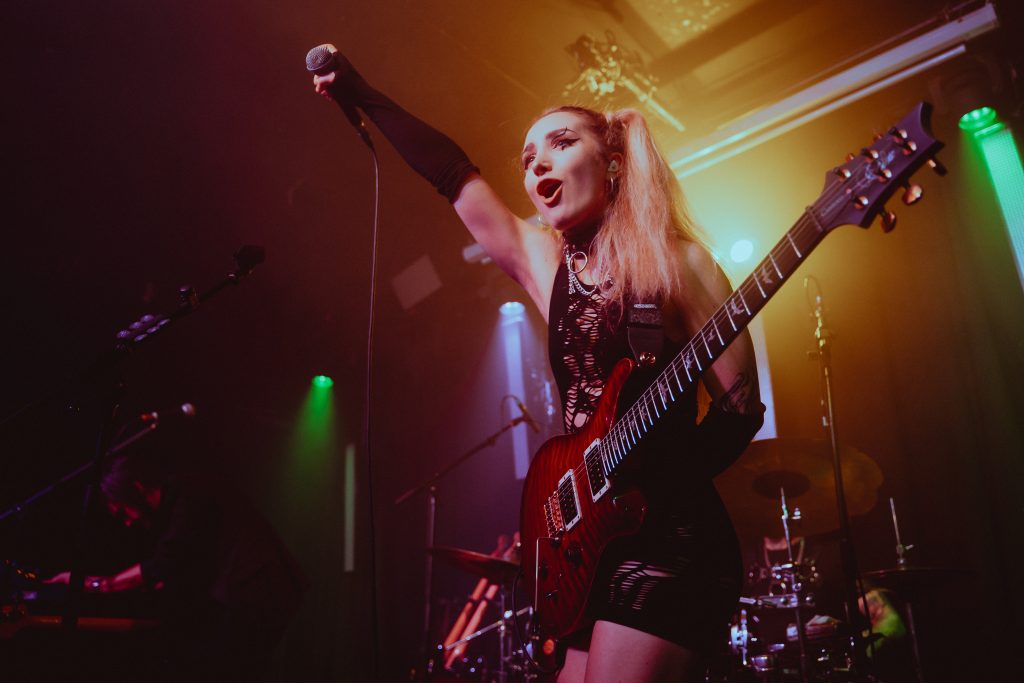
"First and foremost, I’m a guitarist and songwriter. When I was a kid, I never envisioned becoming a content creator."
Why do you think that was?
Everyone was sitting at home, watching Instagram videos, so it was a good time. It worked tremendously in my favor, and I had a couple of things go viral. The “Beat It” solo did really well, for example. It’s funny, though. I see that video now, and I’m like, “Oh, bless you.” At that point, I was figuring everything out.
Did you have a goal when you started sharing content on YouTube?
I started sharing content online when I was about fourteen. It was nothing serious; I just wanted to network and meet other players. Being a young female and playing guitar the way I do and in the genres I like meant I was a black sheep. I just wanted to find people who liked the same music as me.
Back in the day, I connected with a bunch of similar guitarists up and down the country and all across the world. It was cute. Then people started to say, “Oh! She can actually play!” Then I was like, “They like it. I’ll keep going then.” 2019 was when I got serious about it. I said, “I’m gonna try and grow whatever this is because I think it has legs.” And it does.
Inspiration and Challenges
Do people often say you’ve inspired them to play guitar?
Yes, they do. It’s really nice. But it’s hard to get my head around it, sometimes. It is very sweet when I get those comments, but also humbling. When I’m playing, I’m always looking to get better. So, naturally, at the same time, I’m self-critical because I’m always trying to improve. It’s funny because I think I still don’t know what I’m doing!
Why are female guitar players important role models?
I think it’s important to note that this is an incredibly male-dominated industry. And I don’t want any young girl not to play guitar because they’re intimidated by guys. It’s changing, but there’s still a lot of work to be done before it feels evenly balanced. Calling out sexism is important. And that includes dudes calling out other dudes when someone says something out of line. I’ve spoken to many fathers of girls who want to play guitar, and it’s really sad because they’re often scared to. That’s why it’s really important to have female guitarists as role models in the industry.
What sort of challenges did you face growing up as a guitar player?
As a kid, ever since I was five, I loved guitar. I distinctly remember the daughter of a family friend saying, “It’s weird that Sophie plays guitar because it’s a boy’s instrument.” But it never even occurred to me that that was a thing.
So, it’s just about working towards stamping out the separation, misogyny, and sexism. Again, it’s come a long way, but there’s still a lot of work to be done before girls are safe enough to feel truly comfortable.
Some people are uncomfortable with the term “female guitarist.”
Yes. But it’s also the thing that makes a lot of us stand out. It’s tough because we still are a rare breed, I would say. In the last ten years, particularly, it’s come quite far. At school, I sometimes faced a bit of judgment from the boys. I want to think the next generation will be different because of the movements that have happened in recent years. Most of the misogyny comes either from jealous guys my age or older guys saying things like “women belong in the kitchen.”
"It's come a long way, but there’s still a lot of work to be done before girls are safe enough to feel truly comfortable."
Sound of White Noise
Last year, you posted a video calling out inappropriate viewer comments and messages.
Ironically, that was deemed inappropriate, flagged up, and partially demonetized. In other words, I called them out and got penalized for it. It seems unfair because so many were from the comments section, which anybody can see publicly. The internet is a weird place to be sometimes.
How do you process negative and inappropriate comments and messages?
I think writing and recording the song “White Noise” helped. It’s about negative trolls and haters—misogynistic men, essentially. It came about when I did a video with a brand, and they turned it into an ad without telling me. It was outdated, and from a time when I was new to YouTube. In the video, I was younger, and people were being savagely horrible to me for some reason. They were full-on attacking me in the comments about my appearance, playing, everything.
It got to me badly. I felt sad for younger Sophie because she didn’t deserve that. I dwelled on it for a little bit and then turned it into something more powerful by writing “White Noise.” The chorus goes, “I’m sick of you, No one is listening to white noise, I’m sick of you, No one is listening to tough boy.” It’s essentially about them and their negativity. They’re just white noise in the background. My advice is to tune it out so you can’t hear it.
In the future, when I find myself in a negative headspace, I’ll remind myself that I wrote a song about it. It’s a powerful thing. And what I went through applies to anybody’s situation. You shouldn’t listen to these people. I think anybody who criticizes you unfairly most likely isn’t doing better than you. Therefore, they’re not in a position to judge. No one who is doing better than you would say such things. Why would they? That’s how I think about it.
Tell us about the upcoming Bxrrell tour.
It’s my first tour as a headliner—six dates across the UK at the end of May/beginning of June. I’m really excited to finally be back on stage. It’s where I have the most fun.
"With the GT-1000 and my guitar I’m good. My band is spread across the country—north and south—and you can travel light with the GT-1000 and fly with it."
Slicing it Up with BOSS
You’re a fan of the BOSS GT-1000 Guitar Effects Processor. Will you be using it for the Bxrrell tour?
I very well may do. I love it. I used it at a clinic last week in London. I’d used BOSS Katana amps before for that, and they’re great, but I didn’t want to carry one across London with me. With the GT-1000 and my guitar, I’m good. Ideal. Love it. My band is spread across the country—north and south—and you can travel light with the GT-1000 and fly with it. Playing with a massive tube amp can put a smile on your face. But after you’ve carried it up and down three flights of stairs, the grin is gone.
When I got the GT-1000, I was still using tube amps and felt a bit intimidated by it. But I was overcomplicating it in my head. After a while, having spent so much time indoors, I just figured out how to use it properly. I downloaded some BOSS Tone Central Live Set presets from other artists to get close to what I was after and then tweaked them. That was the best approach for me. I really liked the Jack Gardiner, Marty Friedman, and Steve Lukather ones. I was like, “They’re bound to have incredible tones already, so I’ll take those and tweak them.”
"The Slicer is so sick. It actually inspired me to write a song. When I first got it, I sat there for six hours playing with it."
What are your favorite BOSS pedals?
The OC-5 Octave and SL-2 Slicer are my two favorite BOSS pedals. The Slicer is so sick. It actually inspired me to write a song. When I first got it, I sat there for six hours playing with it. It’s a lot of fun. I’m much more into the guitars themselves than anything else, so when I find a cool pedal like the Slicer, I feel like I’m onto something. If I ever feel uninspired, I’ll crack out a weird pedal. I like the hands-on aspect of pedals.
